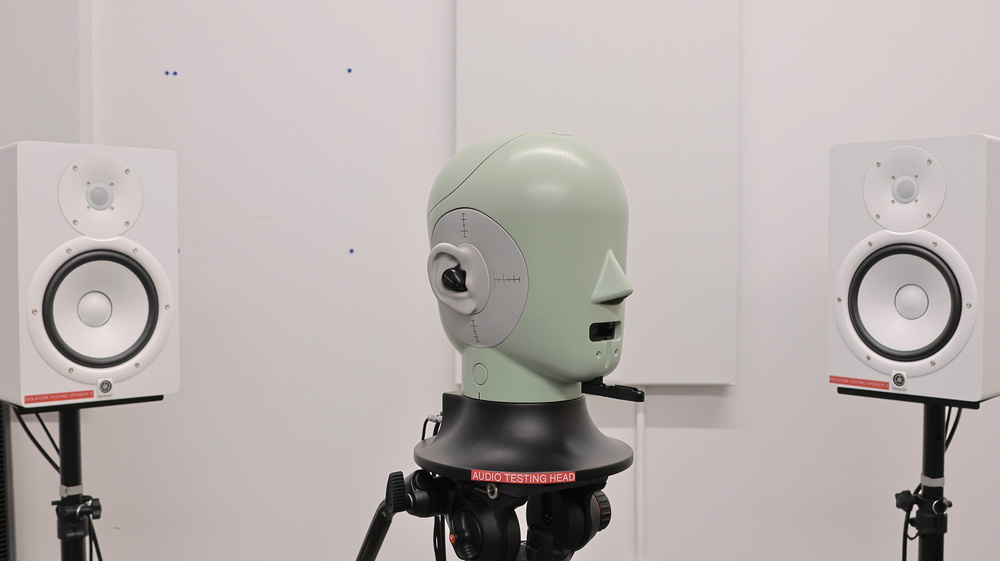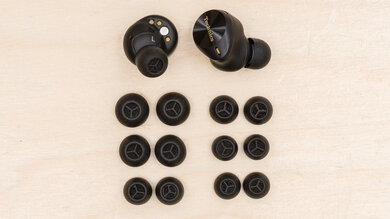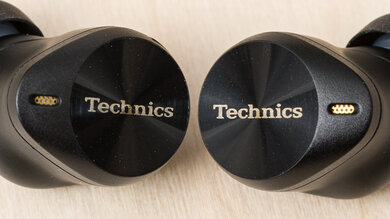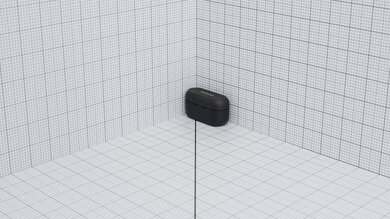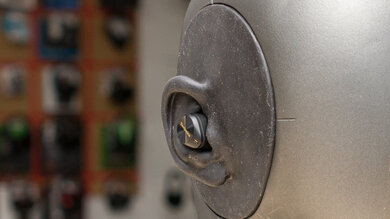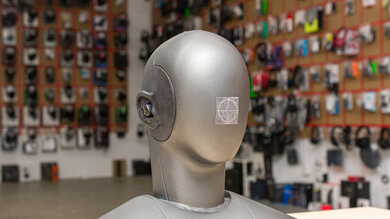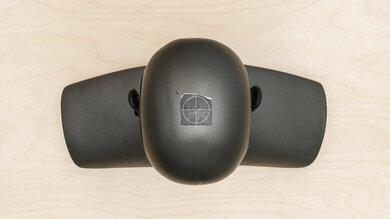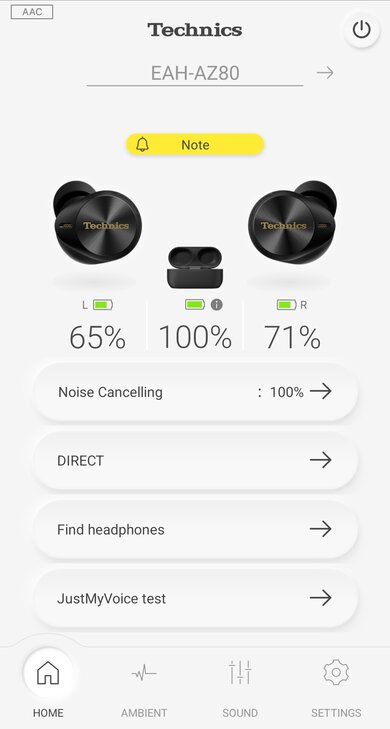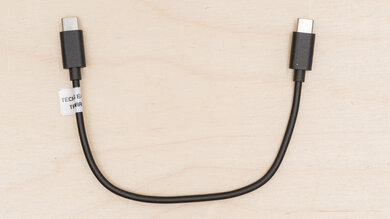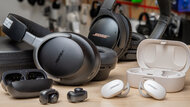The Technics EAH-AZ80 are premium wireless in-ears. These top-of-the-line, noise cancelling buds from this Japanese brand, who built their reputation on Hi-Fis and turntables, bring some distinctive features to the table, like LDAC support and the ability to connect to three devices simultaneously via Bluetooth. They have a low-profile and sleek design that won't look out of place, whether you're on the subway or running up a mountain trail. Plus, the manufacturer advertises a solid continuous battery life of seven hours with ANC enabled, though this will be reduced if you're using LDAC.
Our Verdict
The Technics AZ80 are decent for neutral sound. They have a warm sound profile with a boosted but well-balanced bass. The mids, too, are mostly flat, rendering vocals and lead instruments in crisp detail. The low-treble is slightly veiled, though, which can remove some brilliance from the upper harmonics of vocals, and this is contrasted by a gently boosted mid-treble range that can cause some sibilants to sound harsh. Once you find a good fit from the seven pairs of included earbuds, you'll experience consistent audio delivery, too. Further sound customization possibilities are also available through the graphic EQ and presets in the app if you feel like tailoring the sound profile to your liking. That said, like many other in-ears, their passive soundstage is poor and lacks an immersive quality.
-
Well-built with an IPX4 rating for the buds themselves.
-
Comfortable and stable in-ear fit.
-
High latency with both SBC and LDAC.
-
Poor passive soundstage performance.
The Technics AZ80 are great for commute and travel use. Their lightweight, portable design is ideal for traveling, and their sturdy build quality and solid charging case mean you don't need to worry about damaging them in transit. They're comfortable enough for long plane and train journeys, too, and their impressive ANC system and passively isolating fit combine to block out most bothersome noises, from plane engine rumble to noisy passengers. Their three-way Bluetooth multipoint connectivity means you can stay connected to a whole suite of devices while on the move, though you may need to take advantage of the quick charge function in case the seven-hour battery life doesn't cut it for longer journeys.
-
Can connect with up to three devices via Bluetooth.
-
Great noise isolation performance across the frequency range.
-
Well-built with an IPX4 rating for the buds themselves.
-
Comfortable and stable in-ear fit.
-
High latency with both SBC and LDAC.
The Technics AZ80 are impressive for sports and fitness use. They're exceptionally portable buds that have a comfortable fit and great stability. They're also well-built, and the buds themselves are certified IPX4 against water splash damage, so they won't be the reason you forego running in the rain. Their seven-hour battery life will be enough to get you through all but the most grueling endurance events without a recharge from the case. Plus, their three-way Bluetooth multi-point means you can connect to your phone and smartwatch simultaneously, with a device to spare.
-
Great noise isolation performance across the frequency range.
-
Well-built with an IPX4 rating for the buds themselves.
-
Comfortable and stable in-ear fit.
-
Poor passive soundstage performance.
The Technics AZ80 are good for office use. They have a comfortable, stable fit, and their seven-hour battery life can get you through most of the workday with the ANC enabled. The ANC will also ensure that background office distractions are minimal, effectively blocking out the sound of chatty coworkers and the collective squeals of delight when someone brings a box of doughnuts to share. They also don't leak very much audio, so you don't need to worry about disturbing anyone, even if you like to crank your tunes to the max. The integrated mic's recording quality is passable but makes your voice sound both thin and muffled, so you'll want to consider a dedicated mic setup if you plan on using them for work calls.
-
Can connect with up to three devices via Bluetooth.
-
Great noise isolation performance across the frequency range.
-
Very minimal audio leakage.
-
Well-built with an IPX4 rating for the buds themselves.
-
Comfortable and stable in-ear fit.
-
Mic recording quality isn't the best.
-
Mediocre noise handling performance.
The Technics EAH-AZ80 are not suitable for wireless gaming. While they can connect to your PC or console via Bluetooth, latency will likely be too high for a smooth gaming experience.
You can't use the Technics AZ80 wired, so they're not suitable for this use.
The Technics EAH-AZ80 are okay for phone calls. Their integrated mic's recording quality isn't bad, and you'll be understandable on calls, but your voice will sound thin and a little muffled. It does an okay job of separating your voice against moderately noisy backgrounds, like the hustle and bustle of a busy street, but it struggles with passing trains and other very loud sounds. That said, they're comfortable enough to wear for long family group calls, and their great noise isolation performance means you can focus on the conversation without background distractions.
-
Great noise isolation performance across the frequency range.
-
Well-built with an IPX4 rating for the buds themselves.
-
Comfortable and stable in-ear fit.
-
Mic recording quality isn't the best.
-
Mediocre noise handling performance.
- 7.3 Neutral Sound
- 8.0 Commute/Travel
- 8.3 Sports/Fitness
- 7.6 Office
- 5.7 Wireless Gaming
- 5.6 Wired Gaming
- 6.8 Phone Calls
Changelog
-
Updated Apr 29, 2025:
We've updated the review to mention the Technics EAH-AZ100 in the Battery box.
-
Updated Apr 17, 2025:
We've revised the In The Box box to list the included USB-C to USB-C charging cable.
-
Updated Jan 16, 2025:
Several Sound tests have been updated following Test Bench 1.8. There have also been text changes made throughout the review, including to the usages and product comparisons to match these results.
- Updated Jan 15, 2025: We've converted this review to Test Bench 1.8, which updates our target curve and Sound tests. You can read more about this in our changelog.
- Updated May 14, 2024: Review published.
Check Price
Differences Between Sizes And Variants
The Technics EAH-AZ80 come in two color variants: 'Black' and 'Silver.' You can see our unit's label here. If you encounter a different variant, please let us know in the forums, and we'll update our review.
Compared To Other Headphones
The Technics AZ80 are premium wireless in-ears with ANC technology. The market for earbuds in this price range is very saturated. It puts them in direct competition with excellent in-ears, like the Sony WF-1000XM5 Truly Wireless and the Sennheiser MOMENTUM True Wireless 4. The Sony can provide slightly more noise isolation across most of the frequency range, thanks to their excellent foam ear tips, though the Technics do a marginally better job of blocking out bass frequencies, like engine rumble. The Technics are also better built, and if Bluetooth multi-device connectivity is a deciding factor for you, their three-way multipoint helps them stand out from the crowd. The three-way multipoint might also give them the edge over the Sennheiser. However, the Sennheiser have a better overall noise isolation performance. That said, the Technics have a more comfortable fit and, like the Sony, feature LDAC support for high-resolution audio streaming.
Check out our recommendations for the best wireless Bluetooth earbuds, the best noise cancelling earbuds, and the best wireless earbuds for Android.
The Technics EAH-AZ100 are the successor to the Technics EAH-AZ80. The AZ100 are better in most aspects; their ANC performs better across the board, especially when dealing with bass range noise like engine rumble, their battery life is significantly longer at 12.2 hours, and they support newer features like Bluetooth LE's LC3 codec and virtual surround for immersive listening. That said, the AZ80 are substantially cheaper and have most of the same features.
The Technics EAH-AZ80 and the Sony WF-1000XM5 Truly Wireless are both premium in-ears with noise cancelling technology (ANC). They're both excellent all-around performers with similar feature sets and slight differences, so you could opt for one over the other depending on your preferences. They both have a similar warm sound profile that you can tweak via the in-app EQ and presets. They also have comparable battery life performance and feature LDAC support. While the Technics are better built, the Sony have a slight edge in the noise isolation department, thanks to their excellent passively isolating foam tips. Meanwhile, the Technics have three-way Bluetooth multi-point connectivity, which can be useful if you bounce between a work phone, personal phone, and laptop.
The Sennheiser MOMENTUM True Wireless 4 and the Technics EAH-AZ80 are premium buds with premium feature sets. They both offer a comparable battery life performance and are similarly well-constructed. While both provide a great level of attenuation against ambient sound, the Sennheiser have the edge here, blocking out more external noise across the entire frequency range. That said, the Technics have a more comfortable fit and LDAC support, and they feature three-way Bluetooth multi-device connectivity for staying connected to multiple devices on the go.
Both the Bose QuietComfort Ultra Earbuds Truly Wireless and the Technics EAH-AZ80 require a serious outlay, but you'll be rewarded with a similarly excellent all-around performance. The Bose have a more comfortable fit, combined with a superior noise isolation performance that's great if you travel a lot and like to enjoy your peace. They also deliver audio more consistently and Immersive Audio with head-tracking. Both boast a pretty balanced default sound that leans towards the warm side. The Bose include aptX Adaptive support, and the Technics have LDAC support. The Technics also include three-way Bluetooth multi-point connectivity, which will sway some users compared to the two-device multi-pairing on the Bose.
The Apple AirPods Pro (2nd generation) and the Technics EAH-AZ80 are neck and neck when it comes to performance, and choosing between them will likely depend on how they fit into your existing device ecosystem. Both buds are similarly well-built and comfortable. They even offer a similar noise isolation performance, but the Apple perform better across the full frequency range and in common scenarios. The Apple have a head-tracking feature that can simulate a wider, virtual soundstage. They're very easy to pair and integrate with other Apple devices, thanks to their H2 chip. However, this comes with caveats. If you don't own an Apple device, customization options are limited, whereas the Technics' app is available across multiple platforms and offers a great depth of feature adjustment. The Technics are also equipped with 3-way Bluetooth multipoint, LDAC compatibility, and have a slightly longer continuous battery life.
Video
Test Results
The Technics EAH-AZ80 have a beveled teardrop design that's similar to other premium wireless in-ears like the Sony WF-1000XM5 Truly Wireless or the Sennheiser MOMENTUM True Wireless 4. They're made of smooth plastic and aluminum, with a shiny finish on the exterior plate that tapers to matte on the other side and a gold Technics logo embossed on the front. They're available in 'Black' and 'Silver' color variants.
The Technics EAH-AZ80 have a comfortable in-ear fit. They come with seven pairs of different silicone ear tips, making it easy to find a pair that's well suited to your ear canal shape. Once inserted, they apply minimal pressure to the inside of your ear canal, so inputting controls via the external surface doesn't hurt your ear. The result is a very secure fit and seal. The downside is that they often require a bit of maneuvering to remove from your ear as there's not a lot of purchase to be found on their sleek body.
These in-ears have great controls. They're mostly intuitive, although there's a learning curve at first to memorize the different functions. You can also further customize them via the app. There's audio feedback in the form of a chime every time you register a press or reach maximum/minimum volume. There are additional audio prompts to indicate when you've cycled through ANC and Ambient Sound modes and a melody that plays while in Bluetooth pairing mode. Ambient Sound uses the onboard mics to filter in some external sound so you can stay more aware of your surroundings. The touch-sensitive surface on the exterior of each bud is very responsive, though (although you can adjust this in the companion app). This can lead to accidentally inputting commands while you try to adjust the fit. So you'll want to be careful when adjusting them using the area around the touch surface. It can also be time-consuming to go from minimum to max volume, as you'll need to space out your presses to avoid the wrong command being registered.
On either earbud:
- Single tap: Plays/pauses audio and accepts an incoming call.
- Double tap: Mutes mic while on a call.
- Tap and hold: Cycles between ANC and Ambient Sound modes (you can also adjust this in the app). Ends call when on a call.
On the right earbud:
- Double tap: Skips to the next track.
- Triple tap: Skips back to the previous track.
On the left earbud:
- Double tap: Increases the volume.
- Triple tap: Decreases the volume.
The Technics AZ80 come with a great carrying case. It's small and practical, constructed from solid and sturdy plastic. The lid is sturdy and magnetically latched, so your buds won't spill out if you drop the case. While there's a battery level indicator inside your case, there's no immediate way to check the battery level without opening the case.
The Technics AZ80 have a great build quality. The seven pairs of provided ear tips are made of high-quality silicone that feels sturdier than most. The buds themselves are made of high-quality plastic that feels very solid to the touch. The same goes for the all-plastic construction of the case. The only negative point is that the IPX4 rating for protection against water splashes applies only to the buds and not the case. This still makes them a great choice for outdoor activities, though, where you won't be bringing the case anyway.
The Technics EAH-AZ80 have a warm default sound profile. They're well-suited to a variety of genres, especially considering that you can adjust the sound profile via the presets and graphic EQ in the companion app. In this graph, you can see how the different EQ presets affect the sound profile. They have a virtually flat bass range, with a balanced mid-range that ensures vocals and lead instruments are rendered with plenty of presence and detail. A slight dip in the low-treble can lessen some of the richness of the upper harmonics of vocals, though, and a spike in the mid-treble response can cause sibilants to sound a touch piercing. As with other ANC-equipped earbuds, like the Sony WF-1000XM5 Truly Wireless, their sound profile is slightly different with the ANC enabled, with a slightly boosted bass response audible when the ANC is off compared to on. The sound is also altered when the mic is engaged, for example, when you're on a call. You can see a graph of how this affects the frequency response in Recording Quality.
These buds have good frequency response consistency. We encountered issues achieving a solid seal in the right ear, but we don't anticipate this to be an issue with human ears. This causes a larger level of deviation between left and right than expected. Our results indicate a degree of inconsistency in the treble range between different listening sessions. Still, you'll likely achieve more consistent audio delivery when using these buds regularly.
These buds have great bass compliance. The bass is boosted across the whole region but practically flat. Kicks and subby 808s have plenty of boom, but individual pitches don't jump out of the mix. There's also a touch of extra warmth from the elevated high bass, which helps bring out the fundamental frequencies of bass guitars. However, as this emphasis extends into the low-mids, it can clutter already warm mixes. For example, on songs like Sons of Mischief's 93 'Til Infinity, the lo-fi production treatment means that the bassline and breakbeat occupy similar sonic territory, and these buds struggle to provide clarity and separation between them in the mix.
The mid-range target compliance is great. The low-mids are somewhat over-emphasized, adding substance to snares and toms, but when combined with the boosted high-bass, this can clutter the mix. The rest of the range is well-balanced, so vocals and lead instruments sound clear and present.
The treble compliance is very good. The lower part of this range is slightly underemphasized, which can thin out the upper harmonics and richness of vocals. However, a bump into the mid-treble response adds a slightly harsh quality to sibilants, like hi-hats and cymbals.
The Technics AZ80 have an excellent peaks and dips performance, meaning they follow their own sound profile amazingly well. The only noticeable deviations occur in the treble range, where a series of small peaks and dips can make voices sound slightly distant or bright, depending on the singer's pitch.
The imaging performance is outstanding. While this is the first Technics product we've tested, the brand has developed a reputation for great quality control and ergonomics through its other audio products, like turntables. These buds are certainly indicative of this dedication to quality, as their L/R drivers are very well-matched, and the resulting performance features tight bass and transparent highs. Our unit is also well-matched regarding amplitude, phase response, and frequency, resulting in accurate localization of objects within the stereo field. While there's a very slight mismatch visible on the graph in the mid-mid region, it's not audible in real-life content or sweeps.
As with other wireless in-ears, these buds have a bad passive soundstage performance. Audio bypasses your outer ear by virtue of their design, so they struggle to create a wide, immersive-sounding soundstage. The soundstage, therefore, sounds closed-off and unnatural compared to open-back over-ears which can make it seem like audio is coming from different angles around your head.
The weighted harmonic distortion performance is very good. All frequencies fall within good limits, and although there's slightly more distortion in the high-mid and low-treble range, it's not audible in real-life content. It's worth noting, however, that these buds struggle to reach 100dB of output via our testing rig, though this was more easily achievable when connected to a mobile device.
These are the settings used to test the Technics EAH-AZ80 True Wireless. Our results are only valid when used in this configuration.
The Technics AZ80 have a great full-range noise isolation performance. While they don't have the foam tips and excellent passive isolation of the Sony WF-1000XM5 Truly Wireless, they have an active noise cancelling (ANC) system that does a solid job of blocking out noise across the entire frequency range. With the maximum ANC level, they attenuate more bass range noise than the Sony. However, this could be because the Technics' ANC system isn't adaptive and isn't constantly adjusting to environmental audio. As a result, they do an excellent job of blocking out noises like rumbling bus engines. This extends to the mid-range, too, so background conversations are effectively blocked out, and these headphones provide a considerable amount of attenuation against treble-range noises, too. However, this is more down to the passive isolation provided by their in-ear fit.
Using the controls, you can switch between the ANC and ambient sound mode, which uses the mic to feed in external audio and keep you aware of your surroundings. While these modes are toggleable by the physical controls, you can blend the two via the companion app to find a balance that works best for you.
In common scenarios, these buds perform great across the board. They attenuate very well against the rumble of airplane engines, so you can nod off in peace while on a long flight. They do an even better job of blocking street noise, like onrushing cars and the accompanying honks, and insulate you well from the hustle and bustle of a busy office.
Wind noise is a unique feature for ANC systems to deal with as it interacts directly with the microphones used, which can cause the mics to create a loud, annoying tone from a noise that doesn't even reach your ear.
These buds don't have a wind reduction feature. However, they have a background noise reduction feature so that if you're taking a call, the person on the other end of the line hears your voice more clearly. As a result, we didn't use this feature for this test. Unfortunately, this feature won't do much to mitigate wind noise, so you'll want to avoid using the ANC feature in windy conditions.
The Technics AZ80 have an excellent leakage performance. Audio leakage is mostly concentrated in the treble range, so it sounds thin. That said, even if you're blasting your tunes in a quiet office environment, it's unlikely that anyone around can hear your audio.
The mic's recording quality is passable. However, much of the treble response is shelved, so your voice will sound muffled. It also struggled to pick up lower frequencies, so the recorded audio sounds thin, too. For those who plan on using these buds for online meetings, you can check out a pass done with the integrated microphone activated here. Using the built-in mic can bring about a drop in audio quality due to having to switch to a different Bluetooth profile to transmit (and receive) audio. However, this is a limitation of Bluetooth rather than the buds themselves.
These buds do a middling job of separating your voice against moderately loud environments, so if you need to make a call in a busy street, you'll still be understandable even though there's some background noise present. It struggles more with louder levels of background noise, though, so your voice will drowned out by the sound of an incoming train, for example.
The Technics AZ80 have a decent battery life performance. They last a little over seven hours on a single charge, which aligns with the seven hours the manufacturer advertises. Plus, there are two additional charges contained in the case. However, this battery performance will decrease if you're using LDAC. There's an auto-off power-saving feature to help preserve battery life, and you can adjust the time before this kicks in in the app. The manufacturer also advertises a quick charge feature that gives you 70 mins of playtime with just a fifteen-minute charge. If you need more juice for extended workdays or intercontinental flights, consider the successor to the AZ80, the Technics EAH-AZ100, as they have a significantly longer continuous battery life.
The Technics app is great, with a host of features available and some deep customization possibilities if you're willing to spend some time with it. You can see the battery level of the buds and the case, access the 'find my headphones' feature, and change the voice prompt language and tone. There are a slew of customization options, too, as you can access custom EQ and presets, modify ANC/ambient sound levels, and alter the controls to your liking. You can also access the multipoint settings, change the auto-off timer time, and even use a tool that helps you find the right size tips. You can see a video of the app in action here.
You can't use the Technics AZ80 with a wired connection, but they come with a USB-C to USB-C cable for charging the case.
The Technics AZ80 have great Bluetooth connectivity. They stand out against the competition thanks to the inclusion of three-way Bluetooth multipoint connectivity and their LDAC compatibility for high-resolution audio streaming. However, you can't use these features to the fullest of their abilities, as you can't stream audio via LDAC while connected to three devices. The manual advises only connecting to one device while using LDAC, and connecting to two devices changes the playback quality to 'Best Effort.' These buds are compatible with AAC and SBC codecs, resulting in longer battery life performance than with LDAC. Latency with both LDAC and SBC is on the higher side, though, which can create lip sync issues when streaming video content from a device. Some apps and devices compensate for latency differently, so your experience may vary.
The Technics AZ80 can connect to Bluetooth-enabled PCs for full audio and mic compatibility. However, you can't connect them to your PC in any other way.
The included charging case can carry an additional three charges. You can charge the case using the supplied USB-C to USB-C cable; it also supports Qi wireless charging.
Comments
Technics EAH-AZ80: Main Discussion
Let us know why you want us to review the product here, or encourage others to vote for this product.
Update: We’ve updated the review to mention the Technics EAH-AZ100 in the Battery box.
- 32120
Hello, I found on local market different types of these earbuds: Technics EAH AZ80 Technics EAH-AZ80E-K Technics EAH-AZ80E-S The price difference is huge, so can you help me understand difference between these? Thank you
Hey there, It sounds like you’ve found a deal. Those are all the same Technics EAH-AZ80 model. ‘K’ denotes black, and ‘S’ is for silver. There’s also the EAH-AZ80-A which is the ‘Midnight Blue’ version. Depending on the country, the codes can vary a bit, and retailers aren’t super consistent about listing model names. For instance, I’ve also seen EAHAZ80EK, which would be the black version of the EAH-AZ80. Cheers
- 21010
Hello,
I found on local market different types of these earbuds: Technics EAH AZ80 Technics EAH-AZ80E-K Technics EAH-AZ80E-S The price difference is huge, so can you help me understand difference between these?
Thank you
- 21010
Thanks for the review! I have one question… Did you guys enable “JustMyVoice” in the app before testing the microphone pickup quality of the AZ80’s?
Hi Protomize,
When we do microphone testing, we do not enable Noise Gate settings in the app. That said, we will run additional recordings to show the performance of “JustMyVoice.”
Cheers, Dagobiet

